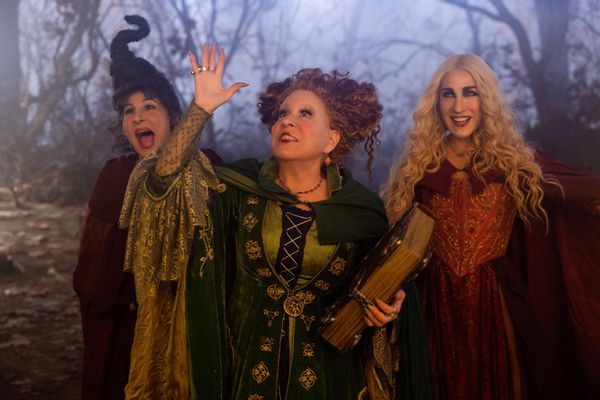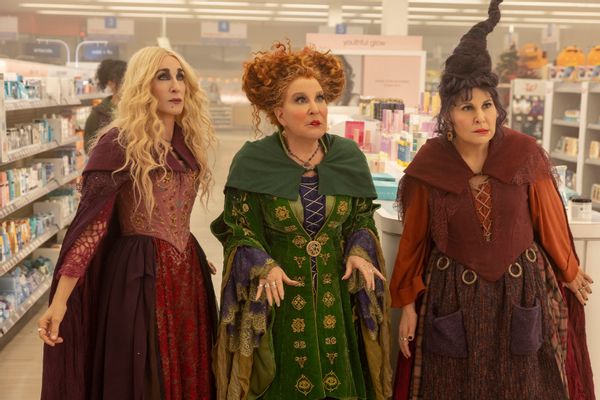
"Hocus Pocus 2" is crash-landing on Disney+ on September 30 and it already has an advantage over the original which came out in theaters during the — blech — summer of 1993. Witchy content, even of the comedic variety, just hits harder in the fall.
Over the decades, the original "Hocus Pocus" has made its way to cult status slowly, like a witch on an unsteady broom, thanks to DVD sales and repeated cable showings. The merchandise game has been strong for years. You can buy "Hocus Pocus"-themed candles, wine tumblers, makeup, cardigans.
This despite the film's grumpy reviews. Rotten Tomatoes described it as "Harmlessly hokey yet never much more than mediocre." Gene Siskel was more harsh in The Chicago Tribune, calling it "dreadful." Some critics seemed shocked that the great Bette Midler would stoop to silly acting in a lowly children's movie, along with Sarah Jessica Parker, years before her "Sex and the City" reign, and Kathy Najimy, just after her "Sister Act" one. Roger Ebert gave the film one star and labeled it "confusing."
Is it scary? No. Does it realize what scares us? Yes. "Hocus Pocus" taps into that key element of childhood fear: adults don't know what they're doing.
"Hocus Pocus" first introduces the Sanderson sisters in1963 Massachusetts when young Thackery Binx (Sean Murray) witnesses his little sister Emily (Amanda Shepherd) get lured away to certain doom. Trailing to a cottage in the woods, he finds Winnie (Midler), Sarah (Parker) and Mary (Najimy) in the process of using Emily as the secret child ingredient in their potion to stay forever young. The Sandersons get caught and hanged, though not before transforming Thackery into a black cat and casting a curse upon the town. In a set-up for the conflict of the film it's foretold that the sisters will be reborn if a virgin lights the Black Flame candle in their cottage.
Fast-forward to a blustery Halloween afternoon in 1990s Salem and a teacher is recounting the tale of the Sanderson sisters to a classroom of teenagers, more rapt and delighted than any teenagers I've ever known. The only one not into it is new kid Max (Omri Katz from the wonderful "Eerie Indiana"), who is forced to take his sister Dani (young Thora Birch) trick-or-treating. On their route, they run into the rich girl Max has a crush on, Allison (Vinessa Shaw). They all head to the Sanderson's cottage, which, in bad ideas, has been preserved as a museum. Seeking to impress Allison, Max lights the Black Flame candle. He's a virgin, as the film tells us incessantly, and the Sandersons come back.

It's mostly three kids against the forces of darkness. Or at least, the forces of dimness.
For much of the original film, it's Max, Allison and Dani on their own. Binx joins them; he can talk and has a wealth of knowledge, having kept tabs on the sisters for generations (he's also immortal), but he is still a cat. Toward the end of the film, the group has the assistance of a charming zombie, but it's mostly three kids against the forces of darkness. Or at least, the forces of dimness. Mary is clumsy and Sarah is ditzy, but Winnie is determined; and they're on the hunt for children for the makings of nefarious spells.
This might be concerning to the children's parents if they were around to take notice.
Max has been saddled with trick or treat duty because his and Dani's parents are going to a party, a big Halloween rager held at town hall. Being forced to babysit when you're a teen who just wants to have fun is a big trope for 80s and 90s spooky fare, showcased in classics like "Adventures in Babysitting" and "Labyrinth." Max doesn't sic goblins on his little sister but he does drag her along on his quest to impress Allison and banish the risen Sanderson sisters.
Essentially, the parents are out of the way. You can't have fun, solve crimes and/or get into terrible danger with the 'rents around to tell you no, call the cops or fix things. Just ask the Goonies, the Szalinskis, Kevin McCallister or any number of unaccompanied minors in films. For instance, in 2022's "The Cellar" the parents miss the supernatural showdown because they're working; in "Labyrinth" and "Hocus Pocus," the guardians are playing.
It's not simply that the parents are not around. It's that they're bewitched and behaving badly.
Both Max's and Dani's and Allison's parents are at parties; drinking, eating treats, wearing costumes, enjoying themselves and generally behaving like children on a holiday that's supposed to be for children. Allison's parents even make her go (and dress up) to their very grownup fête. And while Max's father has adopted a fanged costume which is basically a dad joke come to life ("Dadcula"), his mom (Stephanie Faracy) dresses as Madonna. Cone bra Madonna. As Entertainment Weekly writes, "Imagine if your mom dressed up as Madge for Halloween."
This continues an unfortunate thread often found in movies marketed towards kids: breast jokes. It's funny how you don't remember the sexual immaturity of a story from your childhood until you show it to your own kid (how many times can they say "virgin" in one movie?). But inappropriateness is part of the role reversal too. It's not simply that the parents are not around, It's that they're bewitched and behaving badly.

They eat children; you can't get less maternal than that.
Few things may be as actually scary for a young child as being unable to trust their guardians to properly care for them, or for their own selves. And in parents' absence, the teenagers of "Hocus Pocus" are forced to be parental, much like beloved babysitter Steve of "Stranger Things." Max saves the day because he has to. Binx has carried the guilt for years of not being able to rescue his own sister, a weight that shouldn't have been placed on him as he was still a child too. Where were his parents? At a barn dance?
The Sanderson sisters are not only childless, they eat children; you can't get less maternal than that. They also use children for selfish, shallow purposes: to make themselves look younger and live forever. The trio isn't very villainous but in their crooked, goofy way they present another path for women, not as mothers but as supernatural beings with power.
So too the beloved, if fluffy film, presents a very real fear for children: nobody is in charge and nobody, not even grownups, knows what to do.







